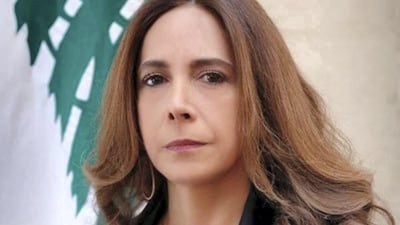Zeina Akar was already the Arab world’s first female defence minister when she also became Lebanon’s new foreign minister on Wednesday amid a diplomatic row with Saudi Arabia.
She now controls two major ministries and is deputy prime minister, albeit in a government which is only operating in a caretaker capacity.
Her predecessor Charbel Wehbe attacked Saudi Arabia twice in a televised interview this week, sparking a diplomatic crisis with Gulf countries.
“This is unprecedented for a female minister to hold such three important posts, in Lebanon and maybe even in the Middle East,” says Imad Salamey, an associate professor at the Lebanese American University.
Yet despite holding key positions in government, political analysts say Mrs Akar will likely have little room for manoeuvre in a resigned Cabinet that holds little power.
A graduate of the Lebanese American University in Marketing and Management, she is one of the closest allies of Lebanese President Michel Aoun in government.
She is the third foreign minister to be appointed in less than two years, a post previously occupied by Mr Aoun’s son-in-law and protégé Gebran Bassil, who was placed on a US sanctions list last year for corruption. Mr Aoun and Mr Bassil are both allied to the Iran-backed Hezbollah.
Nizar Abdel Kader, a retired Lebanese Armed Forces general and military expert, said Mr Bassil is still the decision maker when it comes to foreign affairs.
“So what can Zeina Akar really do in this government?” he said. “This will be up to Michel Aoun and Gebran Bassil.”
Prior to her appointment as minister and deputy prime minister last January, Mrs Akar had never worked in politics or government.
She was previosly the executive director of Information International, a Beirut-based research consultancy she co-founded with her husband businessman Jawad Adra.
The couple also founded INMA, an NGO for social and cultural development, and the Nabu museum in northern Lebanon.
Mrs Akar was appointed last January as part of Prime Minister Hassan Diab’s Hezbollah-backed government, which was meant to enact reforms necessary to unlock billions of dollars in loans from the international community to alleviate the crisis.
Mr Diab’s Cabinet resigned in August, in the wake of the Beirut port blast, which killed more than 200 people and destroyed large parts of the Lebanese capital.
The government has been acting in a caretaker capacity for eight months, as President Michel Aoun and Prime Minister-designate Saad Hariri bicker over ministerial shares in the next Cabinet.
“The solution does not lie with one minister,” Mr Abdel Kader says.
“The solution is for Mr Aoun to facilitate the formation of a government of experts.”


